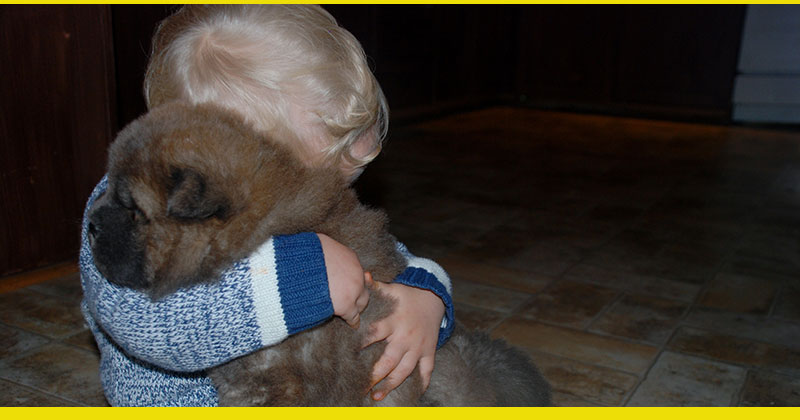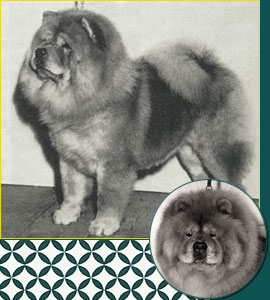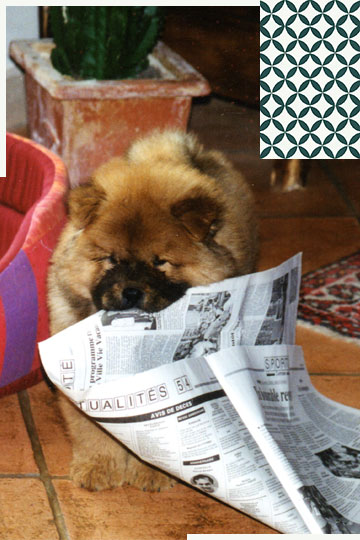 |
IS THE CHOW CHOW THE RIGHT BREED FOR YOU ? |
The fluffy, adorable 8 week old Chow Chow puppy becomes a strong and wilfully independent dog in a few short months. Although the Chow is highly intelligent and extremely loyal to his owner, his strong will makes him a challenge ideally suited to an owner prepared to give him both time and patience. He is serious, dignified, and proud.
The Chow is one of the oldest recognisable types of dog (dating back more than 3000 years). Originally from Mongolia, the Chow was used for guarding temples in China, hunting and herding. Today, the Chow is primarily a companion dog.
Guarding : Possibly because of the role of their early ancestors most Chows are excellent guard dogs only barking when there is something to bark at. They are particularly protective of their owners and 'their' children.
Other animals : A Chow will rarely start a fight with other dogs but is more than able to defend itself if attacked and will always remember what attacked it. Most puppies have a healthy respect for other dogs and cats if introduced to them when very young.
The most common colours are red and black. Chows can also be blue (as in Persian cats), fawn and cream (with or without biscuit-coloured ears). Do be aware of any Chows being for sale in any other colour descriptions these do not conform to the Chow Chow Breed Standard. If in doubt contact the Breed Council Secretary or a Club Secretary for guidance. |
 |
This is down to personal preference and whether the dogs can be kept separately (e.g. during seasons). Both are affectionate but equally obstinate.
Chows are compact, heavily-built dogs and should not be encouraged to jump up or race up and down stairs, as this can lead to injury to their legs. They can run fast over short distances. They love to play in the snow, enjoy dry cold weather and will happily lie outside for hours on end provided they have somewhere to shelter as most Chows dislike getting their feet wet and are reluctant to go out in the rain. Chows do not require a lot of exercise but are always interested in going for walks and enjoying new smells. Puppies should be able to play in the garden and have short (10 minute) walks twice a day until they are a year old when the length of walk can be increased. It is important not to let Chows get too hot. In summer, walk early in the morning or in the cool of the evening. Chows have no road sense and will happily walk down a motorway with traffic dodging either side of them. As a result it is unwise to let them off the lead, other than in an enclosed space, until you are confident they can be recalled and will return on command.
At eight weeks Chow puppies require 4 nourishing, good quality meals a day, with a limited amount of red meat. The breeder should give you a diet sheet detailing the type and quantity of food. They do not normally overeat and should be fed to appetite. Increase the volume of food as the Chow grows. From about 12-14 weeks reduce the number of meals to 3 but increase the quantity until approximately 6 months, after which two meals a day are sufficient but again increasing the quantity It is not recommended to give any dog 'tit-bits' but a few hard biscuits can be given to assist in keeping teeth clean and as a bedtime or breakfast treat. Household 'leftovers' particularly vegetables and fish can be added to the Chow's main meal. Never give cooked bones and always make sure there is plenty of fresh, clean water available to drink. |
Most Chows do not like to get their feet wet but they do enjoy being clean and groomed. Some Chows dribble when excited and it is important to dry the hair on the chest regularly so the skin doesn't become sore and inflamed.
For your own peace of mind it is advisable to take your puppy to a vet close to your home as early as possible for a check-over and any inoculations/worming that may be due as advised by the breeder. |
Entropion : (eyelids that turn in) can require an operation to remove the offending excess skin but providing no damage is being caused to the actual eye your vet may wish to wait until the head has fully developed before operating as the condition can correct itself, when the Chow's head grows. However Chows often have wet eyes, if teething as pups, or when stressed, or in windy conditions, or occasionally when the tear ducts are blocked.
Heatstroke : Again this affects all breeds but particularly heavy-coated ones like the Chow. Never leave a Chow in a car on a hot day - even if the windows are left open and the car is parked in the shade the Chow's heavy coat can result in him overheating and dying. Sometimes an otherwise perfectly healthy dog may get overheated in hot weather or due to stress. This can cause heat stroke and immediate action is needed to cool the Chow down. The easiest method is to stand or sit the Chow in a quantity of cold (not icy) water with a cold, wet towel on his head, until its body temperature drops. Also seek urgent veterinary attention.
Pet insurance is recommended but shop around as policies vary - some have high excesses, exclude preventative treatments such as worming, vaccination, neutering, pregnancy related, have limits per ailment or limits per year and do not cover dogs over 7 years of age.
Your puppy will require a lead and a rolled leather collar so that the fur round puppy's neck doesn't get damaged. Make sure it is tight enough so that he doesn't slip out when pulling. He will also need a food bowl, a water bowl, a pin brush and a metal comb. Puppy will also appreciate a soft toy for in the house and a large rubber toy for outside.
Whilst your puppy is growing he will need a lot of sleep. Puppy should have his own resting place with a blanket and children should be told not to disturb puppy when he is resting in his bed. Chows enjoy being outside during the day but it is important that they have a shaded place to retire to sleep.
One of the cleanest of all breeds, the Chow is easy to house-train. They have many mannerisms of the cat and will often clean their own feet etc. Chow puppies are very clean and barring the occasional accident are often house-trained by eight weeks. Puppy should be put into the garden whenever he wakes up and after each meal. If newspaper is placed near whichever door he uses to go into the garden, puppy will use this at night.
Patience is needed to train a Chow but the basics can be taught and a well behaved dog is so much easier to live with than an unruly big dog you cannot rely upon. A Chow puppy is very adorable but training must begin from the day you take him home, and often requires plenty of firmness. It's never too late to train your Chow, but if he learns bad habits and then you try to change him, it is twice as much work for you. Re-training can be achieved with an older Chow but it is a much slower process and some habits are extremely difficult to break. With the exception of house-training, Chows are not the easiest breed to train as they are very independent. Adult males in particular are very strong, therefore it is essential to train your Chow not to pull on the lead whilst he is still small enough to control. Although Chows learn fairly easily, they seem to say 'what's in it for me' before they will comply with your requests. As a result as soon as you get your puppy he should be taught basic things like standing on a table to be brushed and being led round the garden with his collar and lead on. As soon as his inoculations are complete, local training classes are ideal as puppy can then meet other dogs and people and be socialised at the same time as learning to be well behaved. If your Chow is particularly boisterous you may find other forms of training, e.g. dancing to music or basic agility, gives the Chow an interest and helps to use up its excess energy. If planning to show your Chow discuss this with your breeder and attend ringcraft classes. If there are only obedience classes in your area explain to the tutor that you do not want your Chow to sit whenever you stop as he needs to stand in the show ring.
There are 7 Clubs for the breed in the UK, all of which are members of the Chow Chow Breed Council. The Breed Council is particularly committed to safeguarding and improving the health status of the breed and trying to reduce the incidence of hereditary disease. Membership of the Clubs is not expensive and ensures you will receive schedules of the Club shows if you wish to show your Chow or just to enable you to go along and meet other Chows and their owners.
Chows often require new homes through NO FAULT OF THEIR OWN (death of their owners or broken marriages). Most Chows adapt extremely well to their new home and owner, given a little patience. If you feel you would like to give a rescue Chow in need a home contact the Chow Chow Breed Rescue Co-ordinator, Sheila Jakeman, on Tel: 01608 658491 Chow Chow Club of Scotland Mrs Doreen Lindsay on Tel: 01563 821676.
a) Ask you a lot of questions to ensure you are right for their puppy
a) Expect blind obedience
Read Books on Chows (check the Internet or your local library). Attend shows and speak to breeders. Check out Chow websites.
It is important to go to a reputable Breeder who will give you advice and guidance on your Chow puppy and not to a retail outlet or Puppy Farm. Puppies are often readily available from 'Puppy Farmers' who tend to have several breeds and are only interested in money. They have no interest in where their puppies go, or helping the new owner if the puppy develops physical or behavioural problems. Club secretaries are often aware of litters due to responsible breeders and can point you in the direction of reputable breeders in your area. The Kennel Club have recently set up the Assured Breeder Scheme. Many excellent breeders are not yet members but long term the scheme will help to point potential owners in the direction of well-bred puppies. |
Website by J Marchetti - Chow's Who © 2017 Chow Chow Breed Council - All rights reserved |


